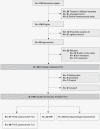Unraveling the relations between post-traumatic stress symptoms, neurocognitive functioning, and limbic white matter in pediatric brain tumor patients
- PMID: 38476931
- PMCID: PMC10929421
- DOI: 10.1093/noajnl/vdae026
Unraveling the relations between post-traumatic stress symptoms, neurocognitive functioning, and limbic white matter in pediatric brain tumor patients
Abstract
Background: Pediatric brain tumor patients are at risk of developing neurocognitive impairments and associated white matter alterations. In other populations, post-traumatic stress symptoms (PTSS) impact cognition and white matter. This study aims to investigate the effect of PTSS on neurocognitive functioning and limbic white matter in pediatric brain tumor patients.
Methods: Sixty-six patients (6-16 years) completed neuropsychological assessment and brain MRI (1-year post-diagnosis) and parents completed PTSS proxy questionnaires (CRIES-13; 1-3 months and 1-year post-diagnosis). Mean Z-scores and percentage impaired (>1SD) for attention, processing speed, executive functioning, and memory were compared to normscores (t-tests, chi-square tests). Multi-shell diffusion MRI data were analyzed for white matter tractography (fractional anisotropy/axial diffusivity). Effects of PTSS on neurocognition and white matter were explored with linear regression models (FDR correction for multiple testing), including age at diagnosis, treatment intensity, and tumor location as covariates. Neurocognition and limbic white matter associations were explored with correlations.
Results: Attention (M = -0.49, 33% impaired; P < .05) and processing speed (M = -0.57, 34% impaired; P < .05) were significantly lower than healthy peers. PTSS was associated with poorer processing speed (β = -0.64, P < .01). Treatment intensity, age at diagnosis, and tumor location, but not PTSS, were associated with limbic white matter metrics. Neurocognition and white matter metrics were not associated.
Conclusions: Higher PTSS was associated with poorer processing speed, highlighting the need for monitoring, and timely referrals to optimize psychological well-being and neurocognitive functioning. Future research should focus on longitudinal follow-up and explore the impact of PTSS interventions on neurocognitive performance.
Keywords: PTSS; limbic system; neurocognition; pediatric brain tumor; white matter.
© The Author(s) 2024. Published by Oxford University Press, the Society for Neuro-Oncology and the European Association of Neuro-Oncology.
Conflict of interest statement
The authors declare that the research was conducted in the absence of any commercial or financial relationships that could be construed as a potential conflict of interest.
Figures


Similar articles
-
Post-Traumatic Stress Symptoms after Pediatric Injury: Relation to Pre-Frontal Limbic Circuitry.J Neurotrauma. 2019 Jun;36(11):1738-1751. doi: 10.1089/neu.2018.6071. Epub 2019 Mar 6. J Neurotrauma. 2019. PMID: 30672379 Free PMC article.
-
A diffusion MRI study of brain white matter microstructure in adolescents and adults with a Fontan circulation: Investigating associations with resting and peak exercise oxygen saturations and cognition.Neuroimage Clin. 2022;36:103151. doi: 10.1016/j.nicl.2022.103151. Epub 2022 Aug 12. Neuroimage Clin. 2022. PMID: 35994923 Free PMC article.
-
Post-traumatic stress, sleep, and neurocognitive problems in children newly diagnosed with a pediatric brain tumor.J Clin Exp Neuropsychol. 2024 Dec 11:1-13. doi: 10.1080/13803395.2024.2426621. Online ahead of print. J Clin Exp Neuropsychol. 2024. PMID: 39660875
-
Relationship between white matter integrity and post-traumatic cognitive deficits: a systematic review and meta-analysis.J Neurol Neurosurg Psychiatry. 2019 Jan;90(1):98-107. doi: 10.1136/jnnp-2017-317691. Epub 2018 Aug 2. J Neurol Neurosurg Psychiatry. 2019. PMID: 30072375
-
The relationship between negative symptoms and MATRICS neurocognitive domains: A meta-analysis and systematic review.Prog Neuropsychopharmacol Biol Psychiatry. 2023 Dec 20;127:110833. doi: 10.1016/j.pnpbp.2023.110833. Epub 2023 Jul 22. Prog Neuropsychopharmacol Biol Psychiatry. 2023. PMID: 37482283
References
LinkOut - more resources
Full Text Sources
